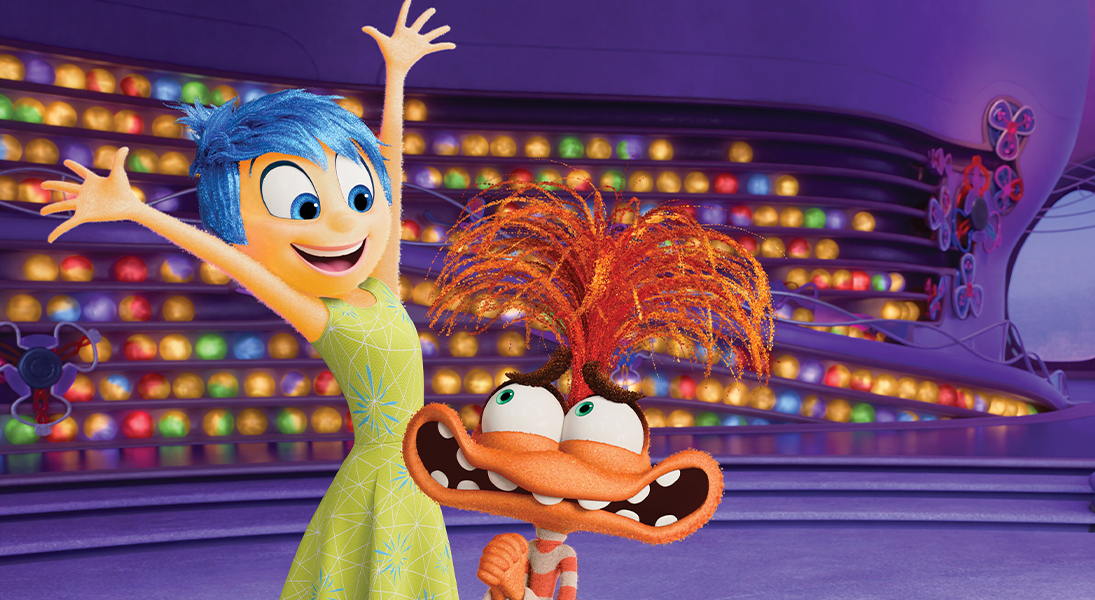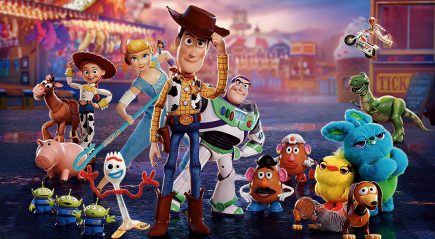When we last left the personified feelings of Inside Out, they seemed to have everything together. In the 2015 Disney-Pixar animated film, Joy and Sadness (voiced by Amy Poehler and Phyllis Smith respectively) came to an alliance as the chief emotions within the mind of preteen Riley, while Anger (Lewis Black), Fear (originally Bill Hader, now Tony Hale) and Disgust (originally Mindy Kaling, now Liza Lapira) all found their roles.
That status quo remains in place at the start of the new sequel, Inside Out 2, which begins with Riley (voiced by Kensington Tallman) entering her teen years. However, the peace lasts just seconds, until the puberty button gets pressed and a whole host of new emotions enter “headquarters,” including Envy (Ayo Edebiri), Ennui (Adèle Exarchopoulos), Nostalgia (June Squibb) and Embarrassment (Paul Walter Hauser).
Leading them all is the frazzled little orange emotion Anxiety (Maya Hawke). Despite her wide grin and deferential attitude to the senior emotions, it soon becomes clear that Anxiety has come to diminish Joy.
“How can I help?” Anxiety asks Joy when she first comes on the scene, offering all sorts of options. She bounces around the room, suggesting she could take notes, get coffee, walk the dog or do anything else that might be needed, rational or otherwise.
As endearing as Anxiety’s can-do attitude might be, it soon becomes overwhelming. When Riley overhears older students making fun of her at high school hockey tryouts, Joy has no answers, leaving space for Anxiety to drive Riley into unleashing a barrage of apologies. Director Kelsey Mann, working from a script by Meg LeFauve and Dave Holstein, visualizes Anxiety as a twitchy orange blur, an unconvincing smile plastered on her face as she slams away at the console that controls Riley’s actions.
While the apologies seem to work for Riley at the time, Anxiety announces that she has a bigger plan. This one requires Riley to ditch her old junior high friends and devote every waking second to getting accepted by her new potential high school teammates.
“That is not Riley!” protests Joy, which Anxiety reads as a compliment. “I know!” Anxiety enthuses in response. “It’s a better Riley! We’ll build her a whole new identity.”
Christians know that anxiety offers only the illusion of control. James tells us to take joy in all things, even our sufferings.
The primary audience of Inside Out 2 might recognize that statement as a setup for the movie’s central conflict, in which Joy and the other emotions try to prevent Anxiety from taking control of Riley. But to anyone older, there’s a sting of recognition.
Even if age 13 may be decades in our own past, and even if we may face stakes much more dire than making a hockey team, adults all know what it’s like to let anxiety lead over joy.
On paper, the choice might seem simple: Why would anyone choose anxiety instead of joy? Inside Out 2 provides an answer with beautiful simplicity.
Joy doesn’t always have the answer for every situation. Sometimes, Anxiety feels better, because the emotion can make us feel as if we’re doing something—as if we’re in control. When the personified Joy falls back after hearing Riley mocked, it’s Anxiety who takes charge, and despite the manic way Anxiety moves around, she nonetheless appears to offer a sense of control.
Relatable as the situation might be, Christians know that anxiety offers only the illusion of control. The book of James tells us to take joy in all things, even our sufferings: “Whenever you face various trials, consider it all joy” (James 1:2-4).
Paul echoes that sentiment at the end of his letter to the church in Phillipi, telling it to “rejoice in the Lord always; again I will say, Rejoice” (Philippians 4:4).
Paul makes this statement as a direct rebuttal to the conflict portrayed in Inside Out 2: “Do not be anxious about anything, but in everything by prayer and supplication with thanksgiving let your requests be made known to God. And the peace of God, which surpasses all understanding, will guard your hearts and your minds in Christ Jesus” (Philippians 4:6-7).
At the start of the movie’s second act, Anxiety literally takes over Riley’s mind, expelling Joy and the original core emotions. Not only does Anxiety fail to solve Riley’s problems, but she creates more and more, depicted as an ever-increasing blur, a constant need to deal with the new problems Anxiety causes.
In that simple image audiences can see the stark flip side of Paul’s promise. Where casting our requests to God creates a peace so great that it’s impossible to understand, letting anxiety rule results in no peace, no solutions and, most of all, no joy.










